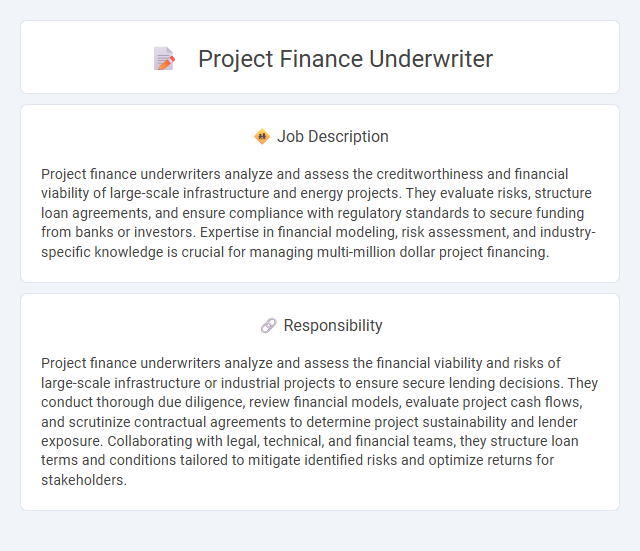
Project finance underwriters analyze and assess the creditworthiness and financial viability of large-scale infrastructure and energy projects. They evaluate risks, structure loan agreements, and ensure compliance with regulatory standards to secure funding from banks or investors. Expertise in financial modeling, risk assessment, and industry-specific knowledge is crucial for managing multi-million dollar project financing.
Individuals with strong analytical skills and a keen eye for detail are likely to be well-suited for a project finance underwriter role, as the job requires assessing financial risks and viability of large-scale projects. Those comfortable working with complex financial models and capable of making data-driven decisions may find this position aligns with their strengths. Conversely, candidates who struggle with high-pressure environments or lack patience for thorough financial analysis might face challenges in adapting to the demands of this job.
Qualification
A Project Finance Underwriter requires a strong foundation in finance, accounting, and risk assessment, often demonstrated by a bachelor's degree in finance, economics, or business administration. Professional certifications such as CFA (Chartered Financial Analyst) or FRM (Financial Risk Manager) enhance expertise in evaluating complex financing structures and credit risks. Proficiency in financial modeling, due diligence processes, and regulatory compliance is essential for underwriting large-scale infrastructure and development projects successfully.
Responsibility
Project finance underwriters analyze and assess the financial viability and risks of large-scale infrastructure or industrial projects to ensure secure lending decisions. They conduct thorough due diligence, review financial models, evaluate project cash flows, and scrutinize contractual agreements to determine project sustainability and lender exposure. Collaborating with legal, technical, and financial teams, they structure loan terms and conditions tailored to mitigate identified risks and optimize returns for stakeholders.
Benefit
Project finance underwriters likely benefit from specialized expertise in evaluating large-scale investment risks, potentially leading to higher job security and competitive salaries. The role may offer opportunities to work on impactful infrastructure projects, providing professional growth and networking advantages within the finance and energy sectors. Exposure to complex financial models could improve analytical skills, enhancing career prospects in related industries.
Challenge
Project finance underwriters likely face significant challenges in assessing the long-term viability and risk of complex infrastructure projects with multiple stakeholders. The probability of encountering unpredictable economic, regulatory, and environmental factors may increase the difficulty of accurately modeling cash flows and default risks. Managing these uncertainties requires advanced analytical skills and a deep understanding of both financial structures and sector-specific risks.
Career Advancement
Project finance underwriters play a critical role in assessing risk and structuring financial solutions for large-scale infrastructure and energy projects, offering specialized expertise that is highly valued in the finance sector. Career advancement opportunities include progressing to senior underwriter roles, portfolio management, or executive positions such as Director of Risk Management or Chief Underwriter. Gaining certifications like CFA or PRM and acquiring skills in financial modeling and regulatory compliance can significantly enhance promotion prospects within project finance institutions.
 kuljobs.com
kuljobs.com